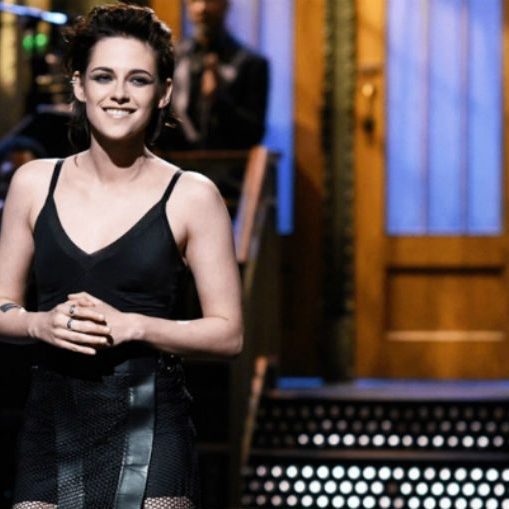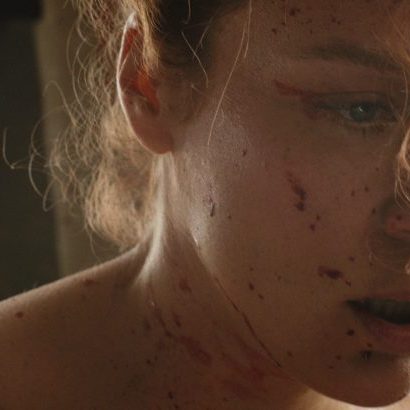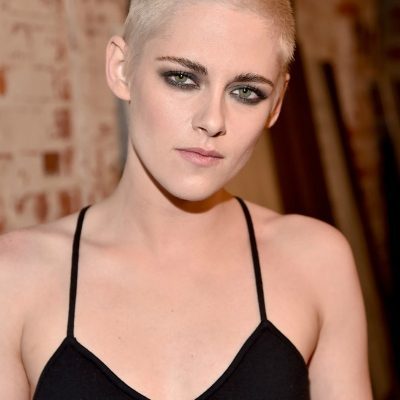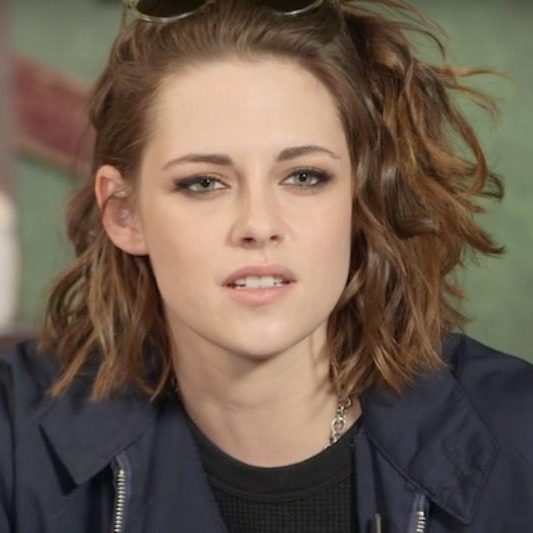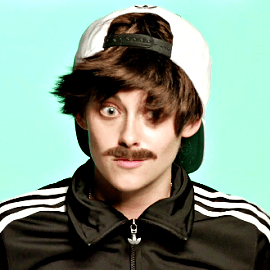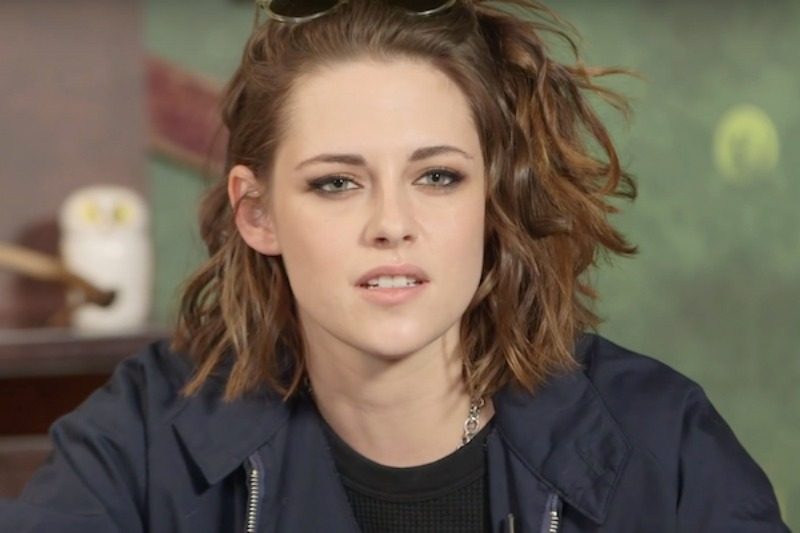
Kristen Stewart is shaping up to be the actor of her generation.
The lesbian appeal of Kristen Stewart arguably began with her first film performances as Patricia Clarkson’s adorable tomboy daughter in Rose Troche’s The Safety of Objects (2001), and as the adorable tomboy daughter of Jodie Foster in Panic Room (2002).
Those two early performances by a nine-year-old were for me reminiscent of Jodie Foster when she was a child star. Like Foster, Stewart, who has three brothers, stayed in the business and also like Foster, grew a show business shell that both attracted and prevented fans from getting too close.
For Stewart, this armour and the ambiguity it created served the Twilight juggernaut but kept her from her lesbian fanbase. She teased us with outings such as The Runaways, in which she portrayed Joan Jett, but she still seemed somehow unknowable.
It’s only fairly recently that we’ve felt able to claim Stewart as one of our own. The August 2015 issue of NYLON revealed a rapport shared by Stewart and Joan Jett on the set of The Runaways. “Your people are here for you,” Jett would tell Stewart by way of encouragement. “Kristen, pussy to the wood!” she would yell if her mentee’s guitar performance needed more grit.
But when would Kristen come out? “Google me,” she said. “I’m not hiding.” If she was, she was hiding in plain sight. She certainly dressed like one of us, and she spent a lot of time with Alicia Cargile. What was her problem? Come out already!
Stewart resisted. She told NYLON: “But I am an actress, man. I live in the fucking ambiguity of this life and I love it. I don’t feel like it would be true for me to be like, ‘I’m coming out!’ No, I do a job. Until I decide that I’m starting a foundation or that I have some perspective or opinion that other people should be receiving…I don’t. I’m just a kid making movies.”
If that seemed evasive, a year later everything had changed. Declared Stewart in a Los Angeles Times interview in July: “I’ve discovered a way to live my life and not feel like I’m hiding at all. And I think that’s pretty apparent for anyone who cares—not that everyone does. But I think that if you had been tracking it in any way, it’s more apparent that I’m more relaxed than I used to be.”
The media had indeed begun tracking her intimacies with Cargile, and then French singer Soko for a few months, and then Cargile again. Stewart knew that hiding was pointless. In fact, she didn’t seem to care.
Getting Stewart to come out on our terms was just about as hard as getting her to smile. Did we deserve better than the conflicted and sullen girl who sidestepped questions about her personal life? Did we give her enough time to show us who she was beyond Bella from a film series watched mostly by teens and tweens? At only 26 years old and with a net worth of $70 million, the pressure to have both privacy and career credibility clearly weighed on Stewart.
Finally, she is mastering herself and her power.
Last summer the tabloids reported that Stewart had split from Cargile and was dating St. Vincent. They were allegedly inseparable in New York that fall, where Stewart took St. Vincent to the 54th New York Film Festival, to a sushi dinner, and exploring the city. They were photographed strolling together in the East Village.
Then St. Vincent allegedly broke up with Stewart, who moved on to model Stella Maxwell. Tabloids speculated if this was too soon… Under such scrutiny Stewart can be forgiven for feeling the pressure to have both privacy and career credibility; for smiling when she feels like it; for being evasive in interviews because life as a young lesbian is complicated. But careerwise at least, finally she is mastering herself and her power.
Watching her at the press conferences for the 54th New York Film Festival this past October, where she had three films showing, there is still a lot of “the kid” about her, but more of the serious artist. For her conference for director Kelly Reichardt’s film Certain Women, She wore showed off her long legs in shorts topped with a T-shirt and black blazer.
She seemed a little awkward still, nervously tapping her maroon and cream Oxfords, and occasionally biting at her thumbnail anxiously. But she answered questions genuinely, even if those answers were brief, halting, or self-deprecating. She was often funny, too, her comments sometimes underscored by wild gesticulating.
Clearly, Stewart was animated by the topic: Certain Women is part of the “good shit” she’s been making recently with non-mainstream directors.
“I’m really not precious about it,” she told us. “I’ve just gotten super lucky lately,” being able to work with non-mainstream directors she has grown up admiring. Certain Women is a slow and quiet drama built around a quadrant of women who live in a small Montana town.
Stewart plays a young lawyer in a tiny firm who must drive hours each night to teach a group of teachers after hours. When a sweet Native American female rancher falls for her, Stewart’s character, while glad of the company but struggling to get by, is oblivious to the woman’s attention.
In one scene, Stewart’s character eats a hamburger and wipes her mouth with a rolled napkin, the cutlery still in it. It’s a curious gesture: unpretentious, awkward, just like Stewart herself. Asked why she chose that gesture for her character she said, “She has no time.
I don’t know, there’s stuff on your face, just get it off. She’s so distracted and fucking self-absorbed…What do you mean, though?,” says Stewart, leaning towards the journalist who asked the question as if she can learn something more about herself and her processes.
Because Stewart is not interested in fame or money. Her focus is on artistic processes. “I would never draw attention to the distinction between doing a big movie and a small one because then you’re like, why are you doing it. That’s weird.
I guess you could technically draw distinctions because you have more money to play with,” she tells us. “I mean, naturally it affects the dynamic a little bit [but] I’ve never approached anything going, Oh this is bigger now, therefore, I’m less entitled to something meaningful, or something.”
Stewart has deliberately chosen meaningful work, especially independent films in Europe. In an interview she did in Cannes to promote the Woody Allen film Cafe Society, Stewart was asked if she enjoyed the world’s most glamorous film festival.
“I love how people take film very seriously here. I’ve devoted my life to observing people and studying behaviour and wanting to be part of making films. This has been my entire life, really, ever since I was a young girl I’ve wanted to do this.
It’s so satisfying to come to Cannes and experience this kind of deep and beautiful appreciation of film as an art form. Usually, when I’m attending a film premiere in Hollywood I become very nervous in those situations, but here in Cannes I’m much more comfortable and I enjoy my time here so much.”
And the French love her back. “It’s very flattering. What I find really funny and sweet is that French journalists are always asking me whether I’m ready to move over here. It’s so inspiring to be in a country, though, where culture is valued so highly.”
In Clouds of Sils Maria (2014), written and directed by French auteur Olivier Assayas Stewart plays a personal assistant to a particularly dykey-looking Juliette Binoche. Stewart won a César Award (the French Oscar) for her efforts, and so pleased was Assayas that he wrote another role for her, this time as the “personal shopper” for a famous young actress in Personal Shopper, a multi-genre ghost story about selfhood, loneliness, and the digital age.
In the film, Stewart plays Maureen Cartwright, a twin with a heart condition, from which her brother has just died. They shared an oath that the first one of them to die would send the other a ‘sign’ from the other side. Maureen is, like her deceased twin Lewis, an amateur medium.
His death gives her the opportunity to text her paranormal skills but it also opens a Pandora’s Box of paranoia, psychic tension, and launches Maureen into an existential crisis about who she is and the limits of control she has over her life.
In Personal Shopper Stewart seems to be most herself: tense, on edge, testing her limits. She is spiritually and quite literally naked in the film. If you wish to see a topless Stewart, this is the film, but it’s not out of voyeurism.
Speaking in New York, Assayas said, “I think what is extraordinary with Kristen is how smart she is with understanding the most intricate complexities of filmmaking; she brings such incredible pace, rhythm and she recreates the character from inside and she does it knowingly but at the same time she is guided by her body.”
It’s really her physicality, he says, that shaped this film in particular, and it was her physicality, often portrayed alone, in isolation, or in combination with technology such as screens or cell phone texts
“Some of the sexiest shit I’ve done on screen, I’m alone,” she told us. “It was like, Oh my god. It’s just such massive disconnection. You’re just fabricating a wonderful reality. That’s not real, it’s just perception.”
“It was really up to Kristen within the shot to put the emphasis on this or that and she dug up from within the character and within the story whatever resonated with her…I think one thing Kristen masters in a way that’s unique is the time within a specific shot,” Assayas shared.
So much so that Stewart became almost a co-creator, taking control of the pacing of the film, extending the duration of certain shots or scenes. “I was not bored one second; I was discovering something new that Kristen was bringing…It’s very much a combination of Kristen’s work and mine.”
It’s perhaps ironic that Stewart’s presence has been harnessed to such commanding effect in a film that is essentially about the power of the things we can’t see. “Nothingness was the start of it,” says Stewart about creating her role, “and it’s like you can’t really always take credit for something that comes through you. It’s fucking weird, but that’s the first time you approach something like that. It’s cool.”
While the film is essentially about Stewart stalking a ghost, the ghost is also stalking her. It’s a parable of 21st Century surveillance, the result of the proliferation of mobile and digital technology. “Yeah it’s funny because I think Maureen wants to be invisible and at the same time she wants to be really seen,” says Stewart.
“And she really struggles with that and I think that’s pretty much everyone right now. Even the most out-there people … I don’t hide anything. I don’t have any public social media things that I engage with but I ultimately want to be seen. It’s weird; we think we have more control over that now than we’ve ever had because we have it in our hands, but we have none.
I don’t know. Like, I have this weird preoccupation with other people, which is so unbelievably distracting…it’s so time-consuming. It’s weird, it’s, there are two sides to it: We stalk each other. I stalk people; I get stalked. We all are obsessive, you know what I mean?
The whole movie she’s struggling with this identity crisis because she’s two very separate versions of a person and that’s not a bad thing, it’s just hard to sort of contending with as a younger person.”
It sounds as though Stewart is not only describing her character; she’s describing herself. Hiding in plain sight. Except if you ask her a question now, she’s likely to answer. Does she have a personal shopper?
“I have a stylist and she’s rad,” says Stewart. “But I choose my shit. I don’t, like, get dressed by someone. But you know, this isn’t mine,” she says, plucking at her gorgeous tailored tuxedo jacket, which she has paired with mustard plaid ski pants and sky-high black stilettos. “We just borrow this stuff and go Thanks, and then we give it back.”
Does she believe in the paranormal? “It’s that thing of, if that’s real for you, then what the hell else is there? There’s so much that we don’t see that we know to be true. It’s kind of self-protective reduction to say, Do you believe in ghosts? Have they touched you?
Well, what else doesn’t touch you that exists? … I don’t know what the fuck energy is, whatever. There’s something that doesn’t go away and whether I’m making that up or I’m actually being left with some residual debris; I feel people fucking intrinsically, you know what I mean? I think it leaves shadows.”
It’s easy to think that mega-famous film stars are so privileged that they’re above fear and impervious to danger but there’s something about Stewart that is so vulnerable, as talented and as powerful as she clearly is.
Personal Shopper is, she has said, “the most isolating and lonely movie I’ve ever made,” but she was drawn to the story because she felt she had much in common with Maureen. “When I was younger I suffered a lot from anxiety and doubts. And like Maureen, I know that feeling of intense isolation that comes from being stuck in your own head.”
The shoot, which involved 16-hour days, was emotional and exhausting but reflected the character’s own exhaustion. “But that’s what makes the process of acting exciting for me. It may seem strange, but I feel more alive and fulfilled when I’m suffering and reaching the point of exhaustion. …It’s been my experience that all those moments of suffering, all those times which while you’re going through them are so devastating, are actually the experiences that are going to make you stronger and more aware.
Whenever I’ve gone through traumatic moments I’ve always come out afterwards feeling more alive and confident. You have this sense that you can finally be happy and feel fulfilled the way you want to be in life.”
In Personal Shopper Stewart is so good it’s easy to believe she is in fact a “nobody” in real life. And it seems possible, observing her in person, that she might actually desire anonymity. She would partly agree. “The biggest issue I have is meeting people for the first time and having to deal with the fact that they already have a specific impression of who I am.
Those impressions are not necessarily wrong, but they’re very subjective. People think they know you from what they’ve read or from some of the characters they’ve seen you play in your films, and you’ve put in the position of having to correct or adjust those impressions.”
If she could be anonymous again she says she’d like to “go to a mall or someplace where I would be able to observe a lot of people. Being curious about people and wanting to observe and study people is one of the reasons I became interested in acting.
I would love to be able to meet someone, look them straight in the face, and not be recognized. It would be really interesting to be able to meet someone that way and not have any preconceived impressions get in the way of that process.”
But it’s the processes of art and of life that Stewart is committed to, not an image of herself that can be endlessly consumed. “I try to do the things that I feel passionate about and focus on the work rather than on the money involved…My view is that you can’t be truly happy unless you keep reflecting on your life and questioning your actions and decisions and whether you’re doing the right thing or not,” she says.
Has she beaten that anxiety; is she happier now? “I’ve learnt that you shouldn’t worry so much about how things might not be how you would like them to be, but instead focus on all the good things that are around. I try to get out and do things that are going to make me feel happy and be creative in my life. I don’t want to be passive when it comes to leading my life.”
When it comes to her film roles at least, she’s making great choices.

